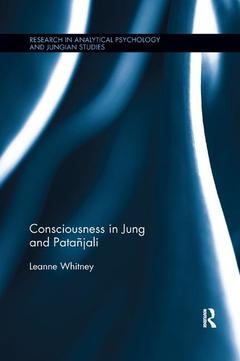Description
Consciousness in Jung and Patañjali
Research in Analytical Psychology and Jungian Studies Series
Author: Whitney Leanne
Language: English
Subjects for Consciousness in Jung and Patañjali:
Keywords
Human Suffering; Consciousness; Pure Consciousness; Jung; Vice Versa; Patañjali; Unus Mundus; Psychology; Classical Yoga; Depth psychology; Ontic Reality; Yoga; Jungian Depth Psychology; Hindu; Tibetan Buddhism; Hinduism; Contemporary Society; Philosophy; Mind Body Unity; Swiss Reformed Church; Yoga Scholar; Subject Object Distinction; Jung’s Search; Jung’s Body; Holographic Model; Subject Object Knowledge; Jung’s World; Implicate Domain; Psychophysical Phenomena; Teleological Directedness; Charcot; Jean Martin Charcot; Jung’s Model
Publication date: 01-2019
· 15.6x23.4 cm · Paperback
Publication date: 08-2017
· 15.6x23.4 cm · Hardback
Description
/li>Contents
/li>Readership
/li>Biography
/li>
The East-West dialogue increasingly seeks to compare and clarify contrasting views on the nature of consciousness. For the Eastern liberatory models, where a nondual view of consciousness is primary, the challenge lies in articulating how consciousness and the manifold contents of consciousness are singular. Western empirical science, on the other hand, must provide a convincing account of how consciousness arises from matter. By placing the theories of Jung and Patañjali in dialogue with one another, Consciousness in Jung and Patañjali illuminates significant differences between dual and nondual psychological theory and teases apart the essential discernments that theoreticians must make between epistemic states and ontic beliefs.
Patañjali?s Classical Yoga, one of the six orthodox Hindu philosophies, is a classic of Eastern and world thought. Patañjali teaches that notions of a separate egoic "I" are little more than forms of mistaken identity that we experience in our attempts to take ownership of consciousness. Carl Jung?s depth psychology, which remains deeply influential to psychologists, religious scholars, and artists alike, argues that ego-consciousness developed out of the unconscious over the course of evolution. By exploring the work of key theoreticians from both schools of thought, particularly those whose ideas are derived from an integration of theory and practice, Whitney explores the extent to which the seemingly irremediable split between Jung andPatañjali?s ontological beliefs can in fact be reconciled.
This thorough and insightful work will be essential reading for academics, theoreticians, and postgraduate students in the fields of psychology, philosophy of science, and consciousness studies. It will also appeal to those interested in the East?West psychological and philosophical dialogue.
Acknowledgements Introduction 1.Patañjali An Overview of Patañjali Patañjali on Consciousness/Unconsciousness Patañjali on Mind/Psyche Patañjali on Ego/Self Patañjali on the Transformation of Human Consciousness References Notes 2. Jung An Overview of Jung Jung on Consciousness/Unconsciousness Jung on Mind/Psyche Jung on Ego/Self Jung on the Transformation of Human Consciousness References 3. Jung and Patañjali Back-to-Back Jung and Patañjali on Consciousness/Unconciousness Jung and Patañjali on Mind/Psyche Jung and Patañjali on Ego/Self Jung and Patañjali on the Transformation of Human Consciousness In Summary References Notes 4. Jung on Yoga The Teological Function of the Psyche Jung on Yoga: Conclusion References Notes 5. A Synthesis of Jung and Patañjali The Efficacy of the Unconscious Validating the Consciousness of the Unconscious References Notes 6. Conclusion References Afterword
Leanne Whitney received her PhD in depth psychology from Pacifica Graduate Institute in Santa Barbara, California. She works as a transformational coach, Yoga teacher, and documentary filmmaker. Leanne’s professional papers include Depth psychology through the lens of Classical Yoga: a reconsideration of Jung’s ontic reality and Jung and non-duality: some clinical and theoretical implications of the self as totality of the psyche co-authored with Dr. Lionel Corbett.

